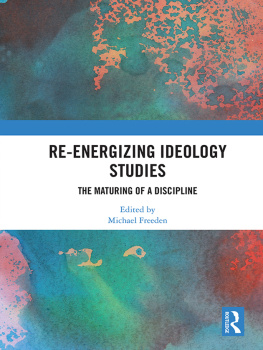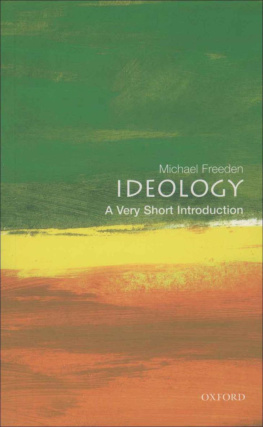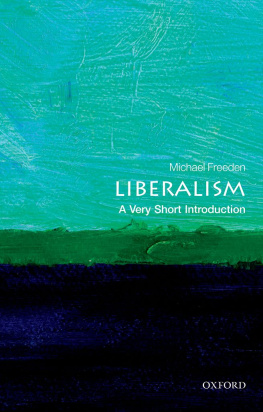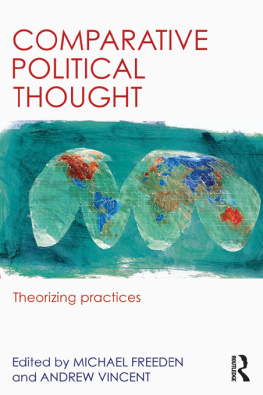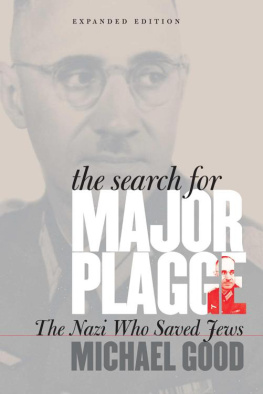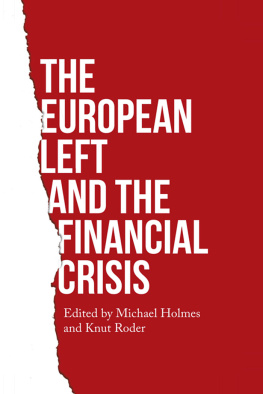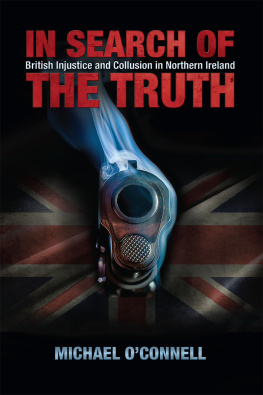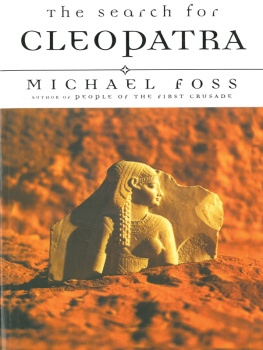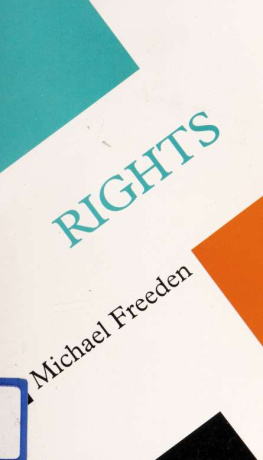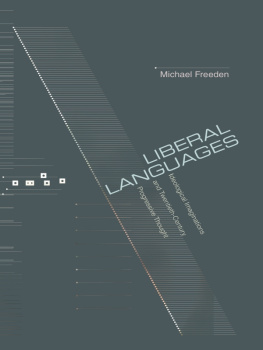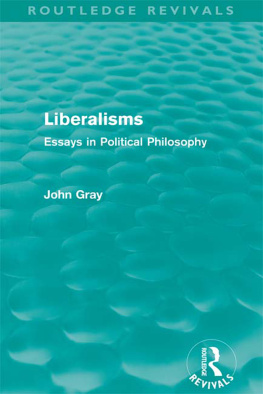Michael Freeden - In Search of European Liberalisms
Here you can read online Michael Freeden - In Search of European Liberalisms full text of the book (entire story) in english for free. Download pdf and epub, get meaning, cover and reviews about this ebook. year: 2019, publisher: Berghahn Books, genre: Politics. Description of the work, (preface) as well as reviews are available. Best literature library LitArk.com created for fans of good reading and offers a wide selection of genres:
Romance novel
Science fiction
Adventure
Detective
Science
History
Home and family
Prose
Art
Politics
Computer
Non-fiction
Religion
Business
Children
Humor
Choose a favorite category and find really read worthwhile books. Enjoy immersion in the world of imagination, feel the emotions of the characters or learn something new for yourself, make an fascinating discovery.

- Book:In Search of European Liberalisms
- Author:
- Publisher:Berghahn Books
- Genre:
- Year:2019
- Rating:3 / 5
- Favourites:Add to favourites
- Your mark:
- 60
- 1
- 2
- 3
- 4
- 5
In Search of European Liberalisms: summary, description and annotation
We offer to read an annotation, description, summary or preface (depends on what the author of the book "In Search of European Liberalisms" wrote himself). If you haven't found the necessary information about the book — write in the comments, we will try to find it.
In Search of European Liberalisms — read online for free the complete book (whole text) full work
Below is the text of the book, divided by pages. System saving the place of the last page read, allows you to conveniently read the book "In Search of European Liberalisms" online for free, without having to search again every time where you left off. Put a bookmark, and you can go to the page where you finished reading at any time.
Font size:
Interval:
Bookmark:
In Search of European Liberalisms
European Conceptual History
Editorial Board:
Michael Freeden, University of Oxford
Diana Mishkova, Centre for Advanced Study Sofia
Javier Fernndez-Sebastin, Universidad del Pas Vasco, Bilbao
Willibald Steinmetz, University of Bielefeld
Henrik Stenius, University of Helsinki
The transformation of social and political concepts is central to understanding the histories of societies. This series focuses on the notable values and terminology that have developed throughout European history, exploring key concepts such as parliamentarianism, democracy, civilization and liberalism to illuminate a vocabulary that has helped to shape the modern world.
Volume 6
In Search of European Liberalisms: Concepts, Languages, Ideologies
Edited by Michael Freeden, Javier Fernndez-Sebastin and Jrn Leonhard
Volume 5
Democracy in Modern Europe: A Conceptual History
Edited by Jussi Kurunmki, Jeppe Nevers and Henk te Velde
Volume 4
Basic and Applied Research: The Language of Science Policy in the Twentieth Century
Edited by David Kaldewey and Dsire Schauz
Volume 3
European Regions and Boundaries: A Conceptual History
Edited by Diana Mishkova and Balzs Trencsnyi
Volume 2
Parliament and Parliamentarism: A Comparative History of a European Concept
Edited by Pasi Ihalainen, Cornelia Ilie and Kari Palonen
Volume 1
Conceptual History in the European Space
Edited by Willibald Steinmetz, Michael Freeden, and Javier Fernndez-Sebastin
Concepts, Languages, Ideologies

Edited by
Michael Freeden, Javier Fernndez-Sebastin
and Jrn Leonhard

First published in 2019 by
Berghahn Books
www.berghahnbooks.com
2019 Michael Freeden, Javier Fernndez-Sebastin and Jrn Leonhard
All rights reserved. Except for the quotation of short passages
for the purposes of criticism and review, no part of this book
may be reproduced in any form or by any means, electronic or
mechanical, including photocopying, recording, or any information
storage and retrieval system now known or to be invented,
without written permission of the publisher.
Library of Congress Cataloging-in-Publication Data
Names: Freeden, Michael, editor. | Fernndez-Sebastin, Javier, 1952
editor. | Leonhard, Jrn, editor.
Title: In search of European liberalisms : concepts, languages, ideologies /
edited by Michael Freeden, Javier Fernndez-Sebastin and Jrn
Leonhard.
Description: First edition. | New York : Berghahn Books, 2019. | Series:
European conceptual history ; volume 6 | Includes bibliographical
references and index.
Identifiers: LCCN 2019014410 (print) | LCCN 2019980640 (ebook) | ISBN
9781789202809 (hardback) | ISBN 9781789202816 (ebook)
Subjects: LCSH: Liberalism--Europe--History.
Classification: LCC JC574.2.E85 I6 2019 (print) | LCC JC574.2.E85 (ebook) |
DDC 320.51094--dc23
LC record available at https://lccn.loc.gov/2019014410
LC ebook record available at https://lccn.loc.gov/2019980640
British Library Cataloguing in Publication Data
A catalogue record for this book is available from the British Library
ISBN 978-1-78920-280-9 hardback
ISBN 978-1-78920-281-6 ebook

Michael Freeden and Javier Fernndez-Sebastin
Franz L. Fillafer
Jrn Leonhard
Javier Fernndez-Sebastin
Rui Ramos and Nuno Gonalo Monteiro
Helena Rosenblatt
Jussi Kurunmki and Jeppe Nevers
Henk te Velde
Maciej Janowski
Paolo Pombeni
Olga Malinova
Michael Freeden
Michael Freeden
Michael Freeden and Javier Fernndez-Sebastin

The term liberal occupies a special place in European culture. Its detractors and opponents may rail about its paternalism, its elitism, its oft-deplorable colonial record and, occasionally, its monadic individualism, but liberalism has been associated with emancipation, openness, reform, tolerance, legality, political accountability, the removal of barriers to human interaction and, above all, humanism, values on which most Europeans pride themselves despite the horrendous events that struck at the heart of European civilization during the twentieth century. If that account may seem too starry-eyed, one has also to recall that many liberals themselves approached their creed from other, extra-humanist angles: the lifting of material economic constraints, a passport to modernization and a constitutional guarantor of a stable, conservatively inclined polity. Nor is that all when a conceptual story of Europe is undertaken. It is not only that many non-European societies have embraced and developed these liberal ideas further; contrary to the perspective adopted by many historical studies, as Javier Fernndez-Sebastin demonstrates in his chapter, these ideas were preceded or paralleled in parts of Hispanic America, occasioning an early two-way transmission of liberal languages across the Atlantic.
For many thinkers, liberalism is neither just an ideology nor a philosophical-political theory like any other, such as socialism, anarchism or conservatism, but rather a set of basic cultural postulates that opens the possibility of debate among all modern ideologies. In that sense, liberalism has often been equated with the mainstream of modern Western civilization and even with modernity as such. Just as it has been said in the sphere of contemporary art that Cubism is not just one ism among many, but the condition for all the others, in the political arena one might also say that liberalism is not just one ism among many, but the condition for all the others. Whether that is indeed the case, or whether liberalism is nonetheless a (multi-)provincial construct is for its students to judge.
In this book we have chosen to put aside our own definitions in order to explore some of the descriptions, interpretations and conceptual constellations of liberalism that have been advanced by a number of historical actors, mostly liberals, in Europe over the past two centuries. Instead of the usual question What is Liberalism?,
Our volume restricts itself to the terms liberal and liberalism, though particularly in Franz L. Fillafers chapter on liberalism under the Habsburgs it acknowledges liberalisms immediate European prehistory as it emerged in a swirl of Enlightenment and religious argumentation at the end of the eighteenth century. We cannot of course cover the conceptual history of the past 200 years in any given chapter, nor can we do justice to all European countries. Together, these studies proffer a measured spatial and temporal cross-cut of the conceptual history of European liberalism in each of the selected countries, through diverse, dedicated analyses of broad segments of that history: as initiating periods, as periods of maturing complexity or as turning-points. In so doing, they reflect the various layers and conceptions that have fermented and matured in liberalisms embrace from its inception as liberalism two centuries ago, and whose continuous internal jostling has produced a powerful and imaginative dynamic. In the tug-of-war between space, time and context, liberal and liberalism have undergone such remarkable mutations that it becomes a challenge to determine whether we are dealing with the same concepts or whether seismic shifts have occurred beneath the surface of the words. If this indicates nothing else, it dismisses the abstract universalism that many political philosophers have conferred on liberalism, even though, unsurprisingly, the contents of that universalism are themselves contested among such philosophers.
Next pageFont size:
Interval:
Bookmark:
Similar books «In Search of European Liberalisms»
Look at similar books to In Search of European Liberalisms. We have selected literature similar in name and meaning in the hope of providing readers with more options to find new, interesting, not yet read works.
Discussion, reviews of the book In Search of European Liberalisms and just readers' own opinions. Leave your comments, write what you think about the work, its meaning or the main characters. Specify what exactly you liked and what you didn't like, and why you think so.

